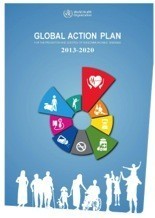Since 2000, World Cancer Day has been an annual occasion for us to reflect on current progress and future action needed for cancer prevention, detection and treatment. World Cancer Day 2014 statistics show that people who engage in risky but modifiable lifestyle  behaviors — smoking, unhealthy alcohol consumption, physical inactivity, and a poor diet — will be among the 25 million new annual cases.
behaviors — smoking, unhealthy alcohol consumption, physical inactivity, and a poor diet — will be among the 25 million new annual cases.
Each one of these new cancer cases and cancer deaths has a personal story attached to it. Here is why this year’s World Cancer Day has special relevance and how cancer has affected my life.
In May 2013, representatives of 194 countries at the 66th World Health Assembly in Geneva approved a landmark resolution to reduce non-communicable diseases (NCDs) by 25 percent by 2025. NCDs, which include cancers, heart disease, and type 2 diabetes, are illnesses that are non-infectious, chronic and slow to progress.
The World Health Organization’s (WHO’s) Global Action Plan 2013-2020 encourages collaborative partnerships among government agencies, public-interest groups and the private sector to reach this ambitious outcome. Country representatives committed to track and report their progress — using 9 goals and 25 indicators — to create healthy food environments, promote physical activity and strengthen health systems.
 This plan is important because cancer is one of four preventable lifestyle-related NCDs that contribute to two-thirds of nearly 57 million annual deaths worldwide. The WHO’s global action plan aspires to hold policymakers and national governments accountable for creating environments where people can afford a healthy diet, engage in regular physical activity and reach a healthy weight.
This plan is important because cancer is one of four preventable lifestyle-related NCDs that contribute to two-thirds of nearly 57 million annual deaths worldwide. The WHO’s global action plan aspires to hold policymakers and national governments accountable for creating environments where people can afford a healthy diet, engage in regular physical activity and reach a healthy weight.
AICR/WCRF’s expert report and its continuous updates conclude that approximately one-third of the most common US cancer cases can be prevented if people consume a healthy diet, engage in regular physical activity and maintain a healthy weight.
In the U.S., progress toward cancer prevention is happening by government-supported Fresh Food Financing grants expanding healthy foods to underserved communities, significant improvements to healthy school meals for children, voluntary pledges made by food companies to cut trillions of calories in food products sold in the marketplace, and physical activity promotion through a national coalition. Essential health benefits for cancer detection and treatment are now covered through ObamaCare that took effect in January 2014.
Some people believe that cancer and other lifestyle-related NCDs are inevitable because they are caused by genetic or environmental factors that cannot be changed. Dr. Alessandro Demaio, Australian physician and NCD Myth Buster reminds us that NCDs are neither diseases of tomorrow, nor diseases of wealthy nations, nor just part of a healthy aging process, nor diseases of poor choices, nor an impossible challenge to overcome.
In 2008, my father was diagnosed with colorectal cancer at the age of 72. He surrounded himself with a supportive team of the best cancer care clinicians at the Cleveland Clinic. After a round of pre-surgical radiation therapy, a permanent colostomy, and post-chemotherapy, he is living a satisfying cancer-free life and looking forward to turning 80 this year.
In 2005, my mother was diagnosed with breast cancer. After having a left mastectomy, she declined any post-surgical chemo or radiation therapy. Instead, she opted for nearly every alternative and many unproven therapies available in the marketplace including fasting, elimination diets and taking dietary supplements. She has always had a fierce will to survive and is still living two years beyond what any of us thought possible.
On this World Cancer Day, I am thankful that both my parents are still alive and respect the choices they have made about their cancer management. I have learned to accept that how one manages a cancer diagnosis is a very personal decision.
For the millions of people and their loved ones who can prevent cancer, I remain hopeful that our personal and professional energies can synergize to create healthy and physically active environments and enable us to measure progress toward realizing a cancer-free and NCD-free world in our lifetimes.
Vivica Kraak, MS, RD, is a public health consultant in the greater Cleveland, Ohio area and a PhD candidate in population health at Deakin University in the Faculty of Health’s WHO Collaborating Centre for Global Obesity Prevention in Melbourne, Victoria, Australia. You can connect with her @VivicaKraak on twitter.





